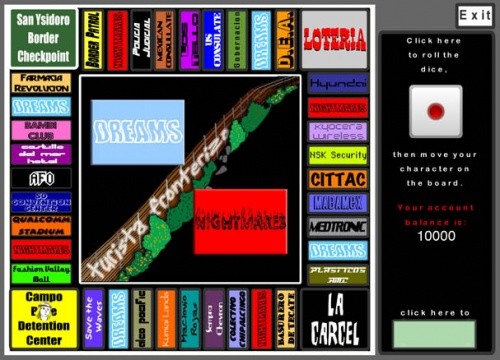Turista Fronterizo
Webgame | 2012
We proposed to design and produce a bilingual virtual board game about daily life bicultural negotiation in San Diego/Tijuana for InSite 05. This game was designed using basic HTML, and thus is simple to use, so that populations unaccustomed to gaming will not be deterred by lengthy instructions or complicated maneuvers. The game looks like a board game, such as Monopoly or the Mexican version Turismo, and the movements around the board are simulated through "point and click" interaction with the screen. It ia a game to be played individually, like solitaire, in order to allow people who are not gaming devotees to partake of the game with ease.
Players have the option to enter the game in English or Spanish and choose from among four player personae. The language and personae chosen determine the particular perspective on life experiences in the border region that each player have - so that the more conversant one is in various idioms of the border, the more one can know about all the angles of the game and the more one has access to "insider" information on both sides of the border. The paths of each player allude to actual experiences that are typical of real life regular border crossers, from elderly Americans who go to Tijuana to buy cheaper prescription drugs medicine, to Mexican day laborers who make their way on foot along Route 5 each day and peddle their skills and trades in San Diego's suburbs.
In creating a virtual board game that acts as a refracted mirror of the sociocultural space of the US-Mexico border, we retrace the steps of the Surrealists and the Situationists . The Surrealists interest in games derived from their belief that creativity could be a shared experience, and that group game playing could function as a mode of exploration.
Situationist Guy Debord's "The Game of War," designed with his wife Alice Becker-Ho in 1987, foregrounds the structural connections between games, warfare and art. We proposed to create a game that allows people from many walks of life and from many different places to "take a trip" through the border zone by playing our game, and to step into the roles of others around them who they might see regularly but never speak to. At the same time, by identifying the ways that pre-fabricated identities shape experiences in the game, we seeked to show how forces outside the control of individuals, whether they are geopolitical laws, the rules of a game, or the entrenched structures of feeling of a given community, delimit the scope of one's experience.
